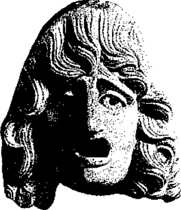Greek tragedy
The great tragedies of Aeschylus*, Sophocles*, and Euripides* were performed annually at the spring festival of Dionysus, god of wine, and inspiration.
Tragic drama developed in Athens in the 6th century B.C., probably arising from the choral cult songs of the Great Dionysia. Tragedy (the Greek word "tragoidia" means goat-song) began with the introduction of an actor, who played various roles by changing masks, whose actions the chorus commented upon in song, and who exchanged dialogue with the leader of the chorus. A tradition began in which three poets would each present at the festival a tragic play in three parts, followed by a satyr play*.
Shakespeare and classical drama
There is no evidence that Shakespeare could read Greek, and there were no translations of Greek drama available for him. He did, however read Latin drama, both tragedy and comedy, and it is likely that he read some of it in the original.
The opinions of Aristotle were well known through the writings of later interpreters of his work, though of the major dramatists of the period, the only one to follow his precepts concerning drama was Ben Jonson, the writer who commented on Shakespeare's "small Latin and less Greek."
Perseus provides the works of both Aeschylus and Euripides in translation as well as in the Greek.
Footnotes
-
Aeschylus
Aeschylus (ca.525-456 B.C.), the "Father of Tragedy," profoundly altered tragic drama by the addition of a second actor, which, according to Aristotle "reduced the chorus' role and made the plot the leading actor." Aeschylus made much use of imagery in his plays, often sustaining a particular image throughout.
Aeschylean tragedy deals with the Fates and the justice of the gods, focusing on the dilemmas faced by leaders in society whose success or downfall affects the lives of many. His plays reflect the contemporary belief that the gods, jealous and resentful of human greatness, typically inflict great persons with a character flaw that brings their ruin. But such tragic heroes were considered responsible for their fate even though it was predetermined by the gods; that is, they were justly punished for their own flaws.
-
Sophocles
Sophocles (ca.495-406 B.C.) won the competition at the Great Dionysia more often than any other of the great dramatists, and his plays were held to epitomize the tragic form. He increased the potential for dramatic conflict by adding a third actor, allowing more complex portrayals of the working of tragic destinies. Sophocles also wrote dramas which were complete in themselves, rather than always part of a trilogy.
Sophoclean drama deals primarily with strong characters who are undone by the combination of a character flaw and unfortunate circumstance. The protagonist's errors of judgment are shown to multiply (perhaps as rumours), affecting the lives of others and ultimately returning to bring his own destruction.
-
Euripides
Euripides (c 480-406 B.C.), the third of the great Greek tragedians, wrote prolifically--some 90 plays, of which 19 survive. He won the prize for the best play only four times (but then the Academy Awards usually get it wrong too).
Of middle-class origins, he wrote of less heroic, more realistic characters. His attitude to the Gods was often irreverent--a fact that may have contributed to his relative lack of success. One device he uses (and it is often seen as a weakness in his plays) is the deus ex machina, a god, not involved earlier in the action, who descends in a stage machine to straighten out the mess humans have got themselves into.
Fortinbras, in Hamlet, could be seen as a figure of this kind.
-
The satyr play
A form of burlesque in which the chorus dressed as satyrs, creatures half goat and half human which in myth were servants of Dionysus; satyrs were infamous for their lustfulness and debauchery. On the Elizabethan stage, plays, including tragedies, were often followed by a jig--a song and dance (often bawdy) to send the audience home happy.
